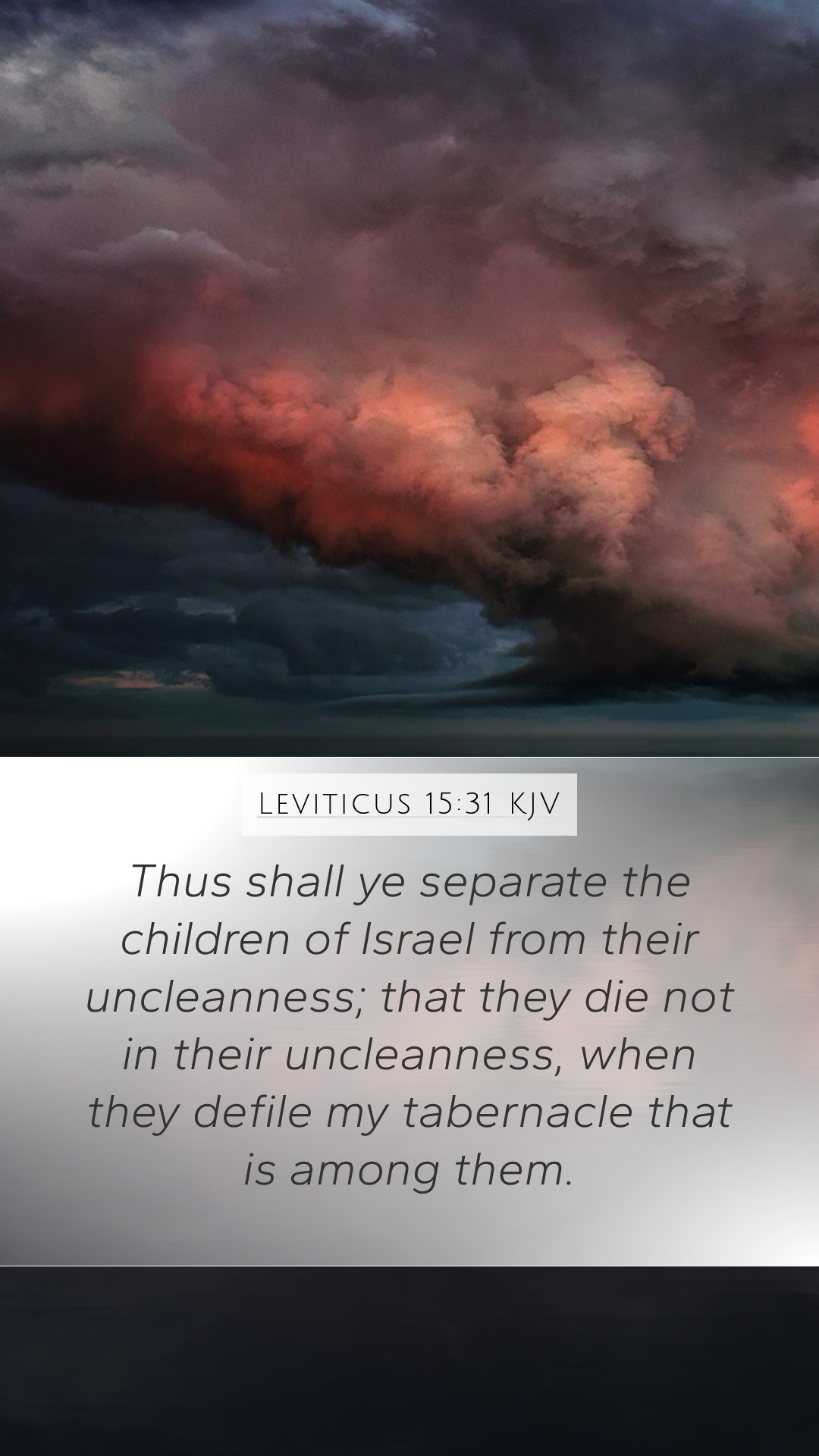Bible Verse Meaning of Leviticus 15:31
Leviticus 15:31 states: “Thus shall ye separate the children of Israel from their uncleanness; that they die not in their uncleanness, when they defile my tabernacle that is among them.” This verse addresses the importance of maintaining ritual purity among the Israelites, particularly in relation to the tabernacle, where God’s presence dwelled.
Overview of Biblical Interpretation
In understanding Leviticus 15:31, it is essential to consider several factors:
- Contextual Background: The book of Leviticus is primarily concerned with laws regarding holiness, purity, and the rituals necessary for approaching God.
- Significance of Uncleanness: The notion of uncleanness in this context refers to both physical and ritual impurities that could hinder the Israelites’ relationship with God.
- Tabernacle Symbolism: The tabernacle represented God’s dwelling among His people, thereby highlighting the need for holiness in His presence.
Commentary Insights
Matthew Henry's Commentary
Matthew Henry emphasizes the notion of separation and holiness. He notes that the Israelites must maintain a distinct identity as God's chosen people. This separation from uncleanness serves not only as a physical barrier but also as a spiritual reminder of the holiness required in approaching God.
Albert Barnes' Notes
Albert Barnes provides a detailed analysis of the implications of ritual purity. He suggests that the instructions in this chapter indicate that failure to observe cleanliness could lead to severe consequences, including death, symbolizing the seriousness of sin and impurity in the covenant community. Barnes also points out that these laws were unique to Israel, highlighting their covenant relationship with God.
Adam Clarke's Commentary
Adam Clarke expands on the practical applications of this verse, suggesting that the physical separations outlined were designed to foster a deeper spiritual understanding of the necessity of moral and spiritual cleanliness. Clarke also emphasizes that these guidelines help maintain the sanctity of the worship environment, which ultimately reflects the character of God.
Key Themes in Leviticus 15:31
- Holiness: The requirement for the Israelites to be holy is foundational in their relationship with God.
- Separation: The call for separation from uncleanness functions as a protective measure to uphold the sanctity of the community.
- Consequences of Defilement: The dire consequences of approaching the tabernacle in an unclean state underscore the seriousness of sin.
Applying the Meaning of this Verse
The principles derived from Leviticus 15:31 can be applied to our lives today. Believers are reminded of the importance of personal holiness and spiritual integrity. Engaging in Bible study groups or using Bible study tools can provide deeper insights into these concepts.
Practical Applications
- Self-Examination: Regular self-examination in light of God’s Word can help maintain spiritual purity.
- Community Standards: Upholding community standards of behavior is essential for the health of the church.
- Daily Living: Applying the teachings of holiness in all aspects of daily life helps believers to remain aligned with God’s purpose.
Research and Cross References
To further understand Leviticus 15:31, consider the following cross-references:
- Exodus 30:20-21: Discusses the need for cleanliness when approaching the altar.
- Numbers 19:20: Speaks on the consequences of remaining unclean.
- 1 Peter 1:16: “Be ye holy; for I am holy.” This New Testament echo reinforces the call to holiness.
Conclusion
In conclusion, Leviticus 15:31 serves as a critical reminder of the importance of holiness and separation in the life of a believer. Through careful Bible verse commentary and scripture analysis, one can glean profound insights that apply not only to ancient Israel but also to contemporary faith practices. Engaging with this scripture fosters a deeper understanding of the Bible and a closer relationship with God.


